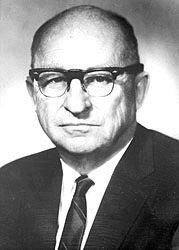Edwin Link
| Edwin Albert Link | |
|---|---|

Edwin A. Link
|
|
| Born | July 26, 1904 Huntington, Indiana |
| Died | September 7, 1981 (aged 77) Binghamton, New York |
| Nationality | American |
| Education | Binghamton Central High School |
| Occupation | Industrialist/entrepreneur |
| Known for | Inventor of flight simulator; underwater archeologist; ocean engineer |
| Spouse(s) | Marion Clayton Link |
| Children | William Martin Link, Edwin Clayton Link |
| Parent(s) | Edwin A. Link, Sr., Katherine Martin Link |
Edwin Albert Link (July 26, 1904 – September 7, 1981) was a pioneer in aviation, underwater archaeology, and submersibles. He is best known for inventing the flight simulator, commercialized in 1929, called the "Blue Box" or "Link Trainer", which started a now multibillion-dollar industry. In total, he obtained more than 27 patents for aeronautics, navigation and oceanographic equipment.
Edwin Link was born in Huntington, Indiana in 1904, the son of Edwin A. Link, Sr., and Katherine (Martin) Link. In 1910, he moved with his family to Binghamton, New York.
He took his first flying lesson in 1920. In 1927, he obtained the first Cessna airplane ever delivered and eked out a living by barnstorming, charter flying and giving lessons.
As a young man, Edwin Link used apparatus from his father's automatic piano and organ factory (of the Link Piano and Organ Company) to produce an advertising airplane. A punched roll and pneumatic system from a player piano controlled sequential lights on the lower surfaces of the wings to spell out messages like "ENDICOTT-JOHNSON SHOES". To attract more attention, he added a set of small but loud organ pipes, also controlled by the roll.
In the 1920s, he developed the Link Trainer, "a fuselage-like device with a cockpit and controls that produced the motions and sensations of flying." Much of the pneumatic system was adapted directly from technology used in the organ factory. (In the 1970s, Link used parts scavenged from an inoperative trainer to help rebuild a Link pipe organ.) He formed the Link Aeronautical Corporation in 1929 to manufacture the trainers. His few early customers were amusement parks, not flight training schools; the early models served as amusement rides. Finally, in 1934, the United States Army Air Corps bought six. During World War II, more than half a million airmen were taught using the Link Trainer.
...
Wikipedia
